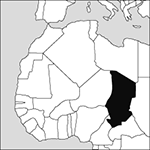
Capital:
Ndjamena
Area:
1,284,000 sq km (495,755 sq miles)
Population:
11,193,452 (2012 est)
Currency:
1 CFA franc = 100 centimes
Religions:
Muslim 53.1%; Roman Catholic 20.1%; Protestant 14.2%; traditional beliefs 7.3%
Ethnic Groups:
Sara 27.7%; Arab 12.3%; Mayo-Kebbi 11.5%; Kanem-Bornou 9.0%; Ouaddai 8.7%; Hadjarai 6.7%; Tandjile 6.5%; Gorane 6.3%
Languages:
Arabic, French (both official); Sara; Nilotic; Saharan
International Organizations:
UN; AU; Non-Aligned Movement; Franc Zone; WTO
A landlocked country in north-Central Africa surrounded by Libya to the north, Sudan to the east, the Central African Republic to the south, and Niger, Nigeria, and Cameroon to the west.
Physical
Out of the Sahara in its northern half rise the volcanic Tibesti Mountains, with reserves of tungsten, while in the east is the great depression surrounding Lake Chad, with deposits of natron (hydrated sodium carbonate).
Economy
Chad is one of the poorest countries in Africa, with a mainly agricultural economy. However, oil production, which began in 2003, has recently driven significant economic growth. The non-oil industrial sector is still small, mostly comprising textiles and food processing. Major exports are oil, cotton, and livestock products.
History
Northern Chad has been inhabited for about 10,000 years and southern Chad since about 500 bc. During the 8th century Berber peoples moved into the area and founded the empire of Kanem. This empire expanded and in the 13th century merged with the kingdom of Bornu. The neighbouring kingdoms of Baguirmi and Ouaddaï grew more powerful during the 16th century. The three kingdoms fought during the 17th century until in the early 1890s all fell under the control of the Sudanese conqueror, Rabeh. French expeditions advanced into the region, and French sovereignty was recognized by the European powers. After confrontation with the British at Fashoda (1898) France declared a protectorate, and in 1908 Chad became part of French Equatorial Africa, though control was complete only in 1912. In 1920 Chad became a colony under French administration, its rich mineral deposits being rapidly exploited. In 1940 Chad was the first colony to declare for the Free French. It became autonomous within the French Community in 1958, and a fully independent republic in 1960, with François Tombalbaye as the first President. Since then the country has struggled to maintain unity between the Arabic-speaking Muslim peoples of the north and the more economically developed south and west. In 1980 Libya invaded, proposing union between the two countries. Civil war lasted until 1987, when French and US intervention led to Libya’s withdrawal and the installation of Hissène Habré as President. Habré was deposed in 1990 by his one-time military commander Idriss Déby, and in 2016, Habré was found guilty of crimes against humanity by an African-Union-backed court in Senegal and sentenced to life in prison in May 2016. A democratization process was agreed upon, and a transitional legislature was installed in 1993. In 1994 Libya agreed to hand back to Chad the Aouzou Strip, an area rich in minerals occupied by Libya since 1973. Armed rebels, based in the south of the country, agreed to a ceasefire in 1996 and a constitutional referendum, which had been postponed several times, was held. A new constitution was approved, establishing Chad as a unitary state. Déby and his supporters were victorious in elections in 1996, 1997, 2001, and 2002. He introduced a constitutional amendment to remove the two-term limit on the presidency and was re-elected in 2006, 2011, and 2016. Déby has developed a system that combines patronage and repression. A civil war was fought against northern rebels from 1999–2002. In 2004 unrest in the Darfur region of Sudan spread to eastern Chad, and in 2006 Chad accused Sudan of supporting a rebellion that almost toppled the Déby regime. In 2008 rebel forces again reached Ndjamena, but again withdrew. In 2015 a new threat emerged as the Nigerian-based Islamist group, Boko Haram, mounted attacks on the shores of Lake Chad. Chad has assisted Nigerian forces retake areas of Nigeria controlled by Boko Haram. Cross-border trade has been seriously affected, and this is having an effect on trading in the capital which is only 50 kilometres from the Nigerian border.
- inference
- inference engine
- inference to the best explanation
- inferential role semantics
- inferior
- inferior conjunction
- inferior good
- inferior planet
- inferred reserve
- inferred tree
- infiltration
- infiltration capacity
- infima species
- infimum
- infinitary language
- infinitary logic
- infinite
- infinite divisibility
- infinite impulse response filter
- infinite product
- infinite regress
- infinite resolution
- infinite sequence
- infinite series
- infinite set